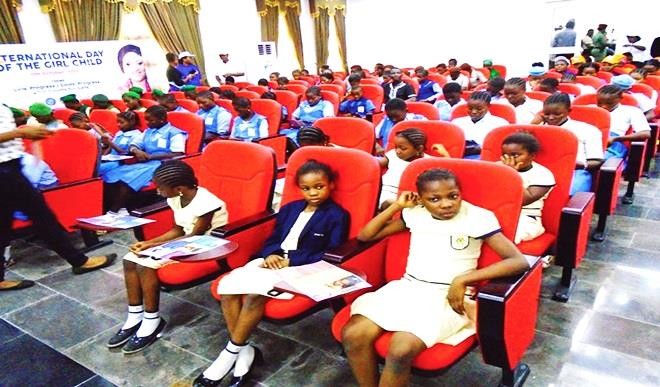In Kogi, stakeholders make case for girl child education
The United Nations in 2011 declared that October 11 annually be marked as the UN International Day for the Girl Child to highlight and address issues affecting the progress and wellbeing of the girl child in a male-dominated world. In Kogi State, wife of the state governor, Mrs. Rashida Bello, through her project, Kogi Women […]


The United Nations in 2011 declared that October 11 annually be marked as the UN International Day for the Girl Child to highlight and address issues affecting the progress and wellbeing of the girl child in a male-dominated world.
In Kogi State, wife of the state governor, Mrs. Rashida Bello, through her project, Kogi Women and Youth Advancement Foundation (KOWYAF), celebrated the day at the Government House, Lokoja, with some secondary school girls in the state.
The forum provided an opportunity for various stakeholders to speak on the odds and discriminations against the girl child/womenfolk and the need to close up the gender imbalance between the girl child and her male counterpart.
Mrs. Rashida Bello lamented the level of discrimination against the girl child and womenfolk in the country and called for more attention to stop the practices.
Speaking in Lokoja on 2016 International Day of the Girl Child, with the theme ‘Girls’ Progress, Goal Progress’, the governor’s wife expressed worry over the growing number of female children that are out of school and called for immediate interventions to change the trend globally.
She also advocated that women in the country should be accorded the opportunities to actualise their dreams in all spheres of life, including holding key political offices like their male counterparts.
Mrs. Bello called for concerted actions to put an end to all forms of violence and other negative practices against the wellbeing of the girl child especially rape, female genital mutilation, child marriage, girl child trafficking and prostitution.
She said girl child education in Nigeria deserved to be given prime attention by both the citizenry and the government at all levels.
She said: “The fact that 6.2 million girls are out of school in Nigeria gives room for worry. Therefore, make it a point of duty to educate the girl child because education counts in the life of the girl child.
“It is a fact that educated girls are likely to delay marriage and pregnancy, which gives them room to fully develop themselves and become mature enough for each stage of their lives.”
In her presentation, Kogi State Coordinator of Community Life Advancement Project, Raliyat Isiyaka, called for the removal of all forms of barriers to enable girls develop their full potentials and skills through equal access to education, training, nutrition, physical and mental health care related information.
Raliyat said: “Investment in girl education benefits the individual, society and the world as a whole. Broad-based education of good quality is among the most powerful instruments known to reduce poverty and inequality.
“In addressing issues concerning children and youth, governments should promote an active and visible policy of mainstreaming gender perspective into all policies and programmes so that before decisions are taken, an analysis is made of the effects on girls and boys, respectively.
“Government should collaborate with NGOs to ensure the enforcement of the Child Rights Act, and all forms of child abuse that hinder the development of a girl child should be punishable by law,” she said.
Also making a presentation, Coordinator of the Wayfarer Inspirational International, Rev. Fr. Thaddeus Akpa, urged parents not to treat the girl child as second class citizen but should rather give her equal opportunities like her male counterparts.
According him, no girl should suffer discrimination on the account of her gender because it is only God that justified the sex of a child.
The Secretary to the State Government, Mrs. Ayoade Folashade Arike, urged young girls to believe in themselves and avoid yielding to the temptation of immoral behaviors that could lead to unwanted pregnancies.
“Don’t let any man deceive you. Don’t let any boy deceive you with recharge cards. Virginity is still golden. Tell them you have a great future ahead of you,” she said.
On her part, the Commissioner for Women Affairs, Mrs. Bolanle Amupitan, urged parents to allow their girls attain the pinnacle of education rather than marrying them off after their primary and secondary level education.
